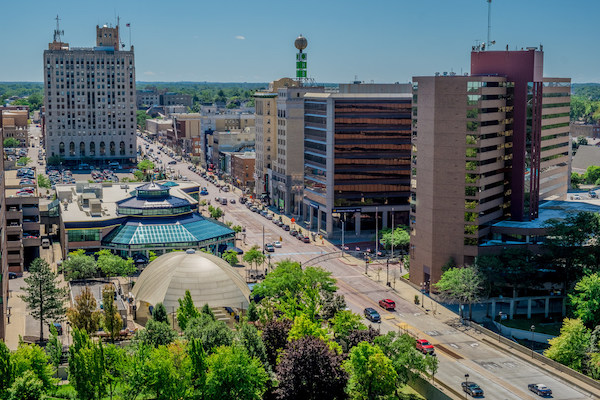UM-Flint receives $300,000 EDA CARES Act grant to support local economic development

The University of Michigan-Flint is the recipient of a grant from the U.S. Department of Commerce's Economic Development Administration (EDA). The funding is from the EDA CARES Act Recovery Assistance grants which were awarded to EDA University Centers across the nation to boost their capacity to support regional economic development strategies in response to the coronavirus pandemic.
UM-Flint's EDA University Center for Community & Economic Development, which is housed in the Office of Research and Economic Development (ORED) works with businesses, municipalities, educational institutions and non-profits in Genesee County to support economic growth for the region. According to David Merot who directs the UM-Flint EDA University Center for Community and Economic Development, the new grant funding will jumpstart new in-demand services.
"We have found that many local leaders are overwhelmed as they navigate the evolving new normal of COVID-19," said Merot. "That's where this grant will allow our team of experts to expand services and support to our partners across the spectrum of industry, education, government, and non-profits. Our work is already underway."
Some of the work that will be supported by the new $300,000 grant includes:
- Implementing community workforce development programs in cyber security to specifically address issues stemming from and related to the COVID-19 pandemic.
- Create a suite of online content in the form of technical assistance training and webinars that will help business owners and entrepreneurs mitigate the economic implications of the coronavirus pandemic.
- The GIS Center team will work alongside campus and community partners to address economic and social impacts resulting from COVID-19, such as market retail analysis and spatial analysis based on the prevalence of COVID-19 cases in the region, unemployment rates, retail sales, loan distribution information, and other socioeconomic variables allowing for comparisons from before and after the pandemic. The resulting studies will provide a repository of information for small businesses, entrepreneurs, and communities in the region to analyze how the economic landscape has changed over time and will assist them in adapting to the new climate.
- The GIS Center will also help to support municipal and education leaders with their data requests, including mapping broadband access, opportunity zones, and demographic trends.
- Developing a product commercialization pipeline by collaborating with a network of subject matter experts and business owners to develop webinars on pandemic-related issues, such as best practices and safety protocols, pivoting to e-commerce or the production of other products/services, supply chain disruptions, international trade implications, etc. This includes holding competitions to develop more effective Personal Protective Equipment (PPE).
- Create a business climate survey measuring economic and social impacts related to the coronavirus pandemic. The survey results will help inform policy makers, economic development professionals, and community leaders about business needs going forward.
"As an economic driver of this region, this new funding makes it possible for us to share the expertise of faculty and staff with our community as we find ways to not just survive these unprecedented times, but to set the stage for growth and success post-pandemic," said Heather Dawson, Executive Director of ORED. "The work that will result from this grant funding will benefit Genesee County and the surrounding area for years to come."
Related Posts
No related photos.
UM-Flint News
The Office of Marketing & Communications can be reached at mac-flint@umich.edu.